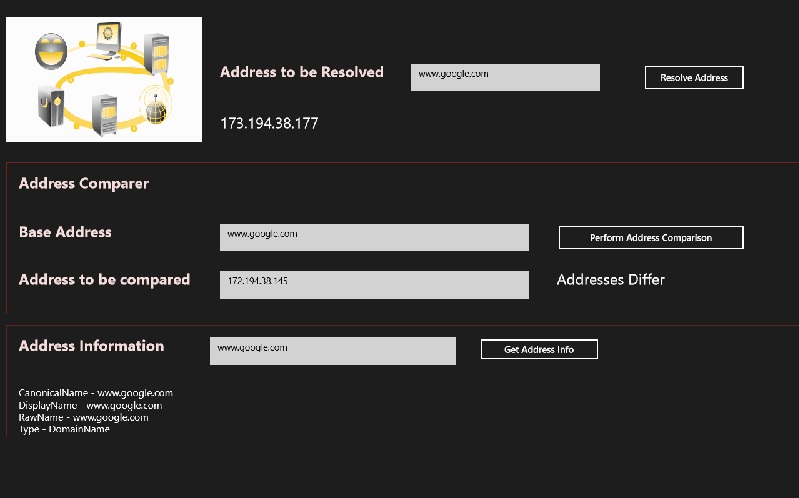Introduction
DNS resolving, IP address comparisons, and getting IP
information are basic tasks that we perform in applications that communicate
with the network. For all those who have worked with previous .NET versions
might get confused when they want to perform a DNS resolve or get IP
information in Metro style application (WinRT) because the very familiar IP
address class like shown below is Missing in Action.
IPHostEntry ipHostInfo = Dns.GetHostEntry(Address);
IPAddress ipAddress = ipHostInfo.AddressList[0];
IPEndPoint endPoint = new IPEndPoint(ipAddress, Port);
Instead a Hostname class has been introduced in WinRT.
Background
The HostName class is used to initialize and provide data
for a hostname used in network apps. A HostName object can be used for a local
hostname or a remote hostname used to establish a network connection. The HostName object is used by many classes in other related
namespaces for network apps. These include the following:
Many classes in the Windows.Networking.Sockets namespace using sockets and WebSockets.
The NetworkInformation class in the Windows.Networking.Connectivity namespace.
The below application is a simple tool which allows you to
parse a string to IP address, resolve DNS, and also to compare different IP
addresses. You can use the methods used here in your own applications.

Using the Code
Including the namespaces:
using Windows.Networking;
using Windows.Networking.Connectivity;
using Windows.Networking.Sockets;
In order to perform a DNS resolve, the below method can be used. This is an async method which will get the address as a string and will perform the DNS resolve
and returns the IP address itself.
public static async Task<string> ResolveDNS(string remoteHostName)
{
if (string.IsNullOrEmpty(remoteHostName))
return string.Empty;
string ipAddress = string.Empty;
try
{
IReadOnlyList<EndpointPair> data =
await DatagramSocket.GetEndpointPairsAsync(new HostName(remoteHostName), "0");
if (data != null && data.Count > 0)
{
foreach (EndpointPair item in data)
{
if (item != null && item.RemoteHostName != null &&
item.RemoteHostName.Type == HostNameType.Ipv4)
{
return item.RemoteHostName.CanonicalName;
}
}
}
}
catch (Exception ex)
{
ipAddress = ex.Message;
}
return ipAddress;
}
Now to parse a string to a IP address (hostname), you can use the below method:
public static bool GetHostName(string ipOrhost, out HostName hostName)
{
HostName internalHostName = null;
bool isValidHost = false;
try
{
internalHostName = new HostName(ipOrhost);
isValidHost = true;
}
catch (Exception ex)
{
isValidHost = false;
internalHostName = null;
}
finally
{
hostName = internalHostName;
}
return isValidHost;
}
To perform a IP address comparison, we can use the below method:
public static async Task<bool> CompareIpAddress(string baseAddress, string secondAddress)
{
bool isequal = false;
if (string.IsNullOrWhiteSpace(baseAddress) || string.IsNullOrWhiteSpace(secondAddress))
return isequal;
string ipAddressBase = await ResolveDNS(baseAddress);
string ipAddressSecond = await ResolveDNS(secondAddress);
if (string.IsNullOrWhiteSpace(ipAddressBase) || string.IsNullOrWhiteSpace(ipAddressSecond))
return isequal;
if (ipAddressBase.Equals(ipAddressSecond))
isequal = true;
return isequal;
}
The above methods have been called in the Click events to demonstrate the use of it.
private async void btnResolve_Click(object sender, RoutedEventArgs e)
{
if (!string.IsNullOrEmpty(txtDnsIP.Text))
{
try
{
lblResolveAddress.Text = await ResolveDNS(txtDnsIP.Text);
}
catch (Exception ex)
{
lblResolveAddress.Text = "Invalid";
}
}
}
private async void btnCompare_Click(object sender, RoutedEventArgs e)
{
if (!string.IsNullOrEmpty(txtBaseAddress.Text) &&
!string.IsNullOrEmpty(txtComAddress.Text))
{
try
{
bool result = await CompareIpAddress(txtBaseAddress.Text, txtComAddress.Text);
if (result)
{
lblResullt2.Text = "Addresses are Same";
}
else
{
lblResullt2.Text = "Addresses Differ ";
}
}
catch (Exception ex)
{
}
}
}
private void btnShowInfo_Click(object sender, RoutedEventArgs e)
{
if (!string.IsNullOrEmpty(txtUrl.Text))
{
try
{
HostName hostInfo = null;
if (GetHostName(txtUrl.Text, out hostInfo))
{
if (hostInfo != null)
{
StringBuilder info = new StringBuilder();
info.AppendLine(string.Format("CanonicalName - {0}", hostInfo.CanonicalName));
info.AppendLine(string.Format("DisplayName - {0}", hostInfo.DisplayName));
info.AppendLine(string.Format("RawName - {0}", hostInfo.RawName));
info.AppendLine(string.Format("Type - {0}", hostInfo.Type.ToString()));
lblResultInfo.Text = info.ToString();
}
}
else
{
lblResultInfo.Text = "Error Hostname";
}
}
catch (Exception ex)
{
}
}
}
The HostName class has the below properties:

Points of Interest
This is a Metro style application which requires .NET Framework 4.5 to work.
